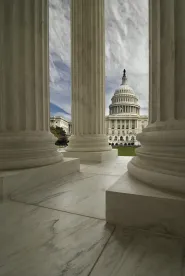Recent calls by anti-trade groups to abandon investor-state arbitration (often referred to as “investor-state dispute settlement,” or ISDS) ignore the modern reality of the global economy and conjure images of Chicken Little’s warnings that the sky is falling. Investment flows exceeded $1.45 trillion globally in 2013. Of the billions of dollars in cross-border investments in place today, only a few hundred investment disputes have been filed based on treaties that allow investors to bring claims against states, for, among other things, monetary damages when their property has been taken by a foreign government without compensation. Rather than leaving wronged Americans to rely solely on the U.S. State Department or foreign courts, the U.S. should stand behind its 21st Century investor-state dispute settlement regime. Why? It depoliticizes disputes, is increasingly transparent and provides foreign investors — and states — with a fair system for adjudicating disputes when they arise.
The U.S. government has long recognized the importance of ensuring that investors are protected against discrimination, arbitrary treatment, and expropriation. These protections are largely symbolic, however, unless investors can present their claims – should any arise – to a neutral tribunal. The courts of a government that has (perhaps) just taken that investor’s property may not be neutral, and an investor, understandably, may be wary about presenting a claim in local courts. That is particularly true where rule of law is questionable, but politicized disputes deserve a neutral forum even where domestic courts are generally viewed as independent. For these reasons, U.S. investment treaties (and free trade agreements) have traditionally included investor-state dispute settlement provisions.
Investor-state dispute settlement is not new. It has been a fundamental part of international trade and investment agreements for more than half a century, and there are more than 3,000 agreements that include investor provisions. Investor-state dispute settlement has promoted adherence to the rule of law, expedited the resolution of disputes, and prevented diplomatic feuds over the poor treatment of individual U.S. investors. In an increasingly competitive world economy for American companies, particularly in areas such as intellectual property, telecommunications, and financial services, investment protections are important, and a neutral forum to arbitrate disputes equally so.
Rejecting this crucial way to settle international disputes in TPA and TPP would put U.S. investors at a potential disadvantage in overseas markets. As a foreign state hosting a U.S. investment, there is discipline in knowing that if the state expropriates property or violates fundamental principles of fair and equitable treatment, that it can be held accountable. Investor-state dispute settlement also saves the U.S. government and taxpayers from having to bring a state-to-state action to enforce every violation of international investment law that harms U.S. interests.
TPA and TPP also present an opportunity to lead and set global standards for investment protections and ISDS alike. The U.S. has been a leader in the effort to modernize the international regime for cross-border investment, including dispute settlement, so that it responds to 21st century needs, such as preserving a government’s ability to regulate and facilitating transparent and inclusive dispute settlement proceedings. Opponents have seized upon the “right to regulate,” as if it is under attack by TPA and TPP investment provisions. Yet there is no evidence to support this claim. In the first instance, no investment treaty can “prevent” a government from taking whatever actions it chooses, including confiscating private property, as long as compensation is paid. Just as the U.S. government can take a U.S. farm to build a highway if the owner of the farm is compensated for his property, so, too, can foreign governments seize U.S. investments so long as compensation is paid. It is a bedrock principle of both U.S. constitutional and international law that the government must pay those whose private property is taken. U.S. investors abroad are entitled to have that compensation determined by a neutral panel of arbitrators, rather than subject themselves to the judgments of local courts.
The dispute settlement procedures themselves under the U.S. model are designed to promote fairness and transparency. The investor appoints one arbitrator, the respondent state appoints an arbitrator, and a neutral chair is either agreed or appointed by an independent institution. Those frequently chosen as arbitrators include former government officials as well as international human rights scholars. Third parties, including NGOs, may participate in ISDS proceedings as amicus, just as third parties can participate in U.S. court proceedings. And briefs and other filings from proceedings, as well as the arbitrators’ ultimate decisions, are generally available to the public. Those who want to participate in, or even just follow, dispute settlement proceedings are able to do so with ease.
Yes, investors have sued foreign states under these provisions. Whenever legal rights are granted, the scope and application of those rights will at times be disputed. Generally, meritorious claims will succeed, while unfounded claims will fail. Surely, we ought not discard legal protections simply because parties sometimes seek their enforcement. The question then becomes whether the triggers for litigation are set in such a way that litigation is excessive or frivolous. Neither seems to be the case, and in any case the U.S. has supported new provisions to facilitate the quick dismissal of frivolous suits.
On the merits, governments win more than investors. The U.S. government has never lost a case. The Center for Strategic and International Studies reports that about a third of cases settle — meaning the enforcement mechanism leads to a win-win result. Of the cases that are litigated, states win ISDS claims about twice as often as investors. And when investors do prevail, awards average a mere 10 cents on the dollar for the amounts sought.
In short, investor-state dispute settlement does not undermine a country’s ability to protect public welfare through regulations. To the contrary, ISDS simply protects investors from abuse at the hands of a foreign government. Indeed, a modern, global system of investment, and support for U.S. businesses abroad, demands a robust way to settle investor-state disputes. We have that system in place. To get rid of it would be a mistake. Investment protections are not worth the paper they are written on if they lack meaningful enforcement mechanisms. The U.S. should continue to lead and include investor-state dispute settlement in any agreement aimed at providing protections for U.S. investors abroad.





 />i
/>i

